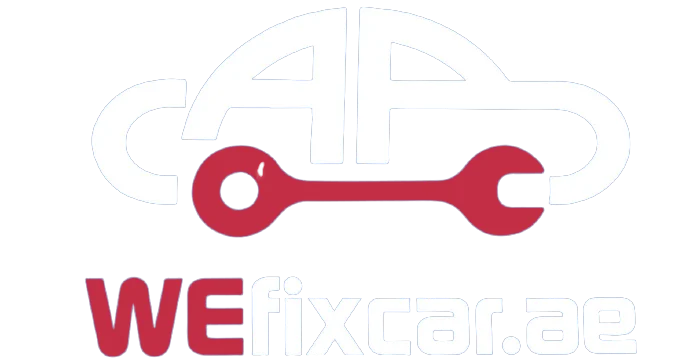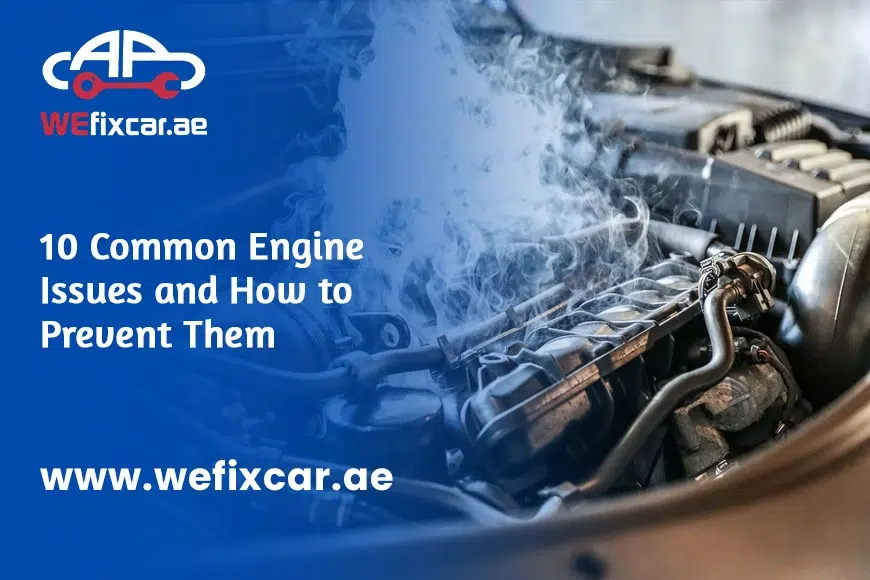10 Common Engine Issues and How to Prevent Them
The engine in your car gives power to both its movement and its comfort by controlling heat and air. At the same time, the system is easily damaged, and if you don’t spot early problems with your engine, you may end up paying for major repairs or needing to replace it. Mobile Van Service work is what we do best at We Fix Car, and we can fix your car wherever we come to you. In this article, we’ll identify 10 usual engine issues, explain the signs to spot, discuss their reasons and advise on how to keep damage away.
Overheating Engine
An overheating engine can be a dangerous problem in the UAE’s intense heat. Heat can cause the engine to become bigger, distort pieces of metal and ruin the engine block.
Causes:
- Coolant levels are too low or there’s a leak.
- When your radiator fan breaks or stops working.
- Faulty thermostat
- Clogged radiator
Symptoms:
- The temperature is higher than it should be.
- Vapour appears from the hood.
- A sweet aroma is given off by combusting coolant.
Prevention:
- Check the coolant level regularly and add more when needed
- Replace and refill the coolant after you have travelled 50,000 kilometres.
- It is important to have the radiator, fan, and water pump looked at and serviced regularly.
Failure to follow this may cause your engine to wear out faster and cause expensive damage. Avoiding engine failure starts with proper care of your vehicle’s engine parts.
Engine Knocking or Pinging
If a vehicle makes an engine knock sound, it usually indicates that the combustion in the cylinders is seldom uniform. If not fixed, this will wear out pistons, rods, and bearings.
Causes:
- Low-octane fuel.
- Particles are forming on the cylinder walls.
- Defective spark plugs or problems with the car’s timing.
Symptoms:
- There’s a ringing sound like metal.
- A way to beat fuel economy.
- Decreased output from the engine.
Prevention:
- Always use the fuel recommended by the car’s manufacturing company.
- Changing spark plugs should be scheduled.
- Perform diagnostics on the engine timing for fuel and ignition.
This noise is typical of car engines and needs to be checked immediately to prevent further damage.
Oil Leaks
An oil leak in the engine isn’t just a bother; it reduces the oil supply, increases friction and can seriously harm the engine.
Causes:
- Degraded gaskets or seals.
- Damaged oil pan.
- Cracked engine block.
- Loose oil filter or drain plug.
Symptoms:
- Oil spots under the car
- Burning oil smell
- Low oil levels or a warning light
Prevention:
- Monitor oil levels regularly.
- Replace worn seals and gaskets.
- Conduct regular oil changes with high-quality oil.
Frequent leaks could indicate deeper engine issues, so don’t ignore them—book a mobile engine repair check-up with We Fix Car.
Check Engine Light (CEL) Activation
The check engine light is your vehicle’s way of saying something’s wrong. It may not always indicate an emergency, but it should never be ignored.
Causes:
- Oxygen sensor failure
- Faulty mass airflow sensor
- Loose gas cap
- Emission system issues
- Engine misfire
Symptoms:
- Steady or blinking CEL
- Poor performance
- Reduced fuel economy
Prevention:
- Use a scanner to retrieve the diagnostic trouble code (DTC)
- Fix the root cause rather than resetting the light
- Keep up with scheduled engine maintenance
We offer on-site automotive diagnostics anywhere in the UAE to identify and resolve the issue quickly.
Engine Misfires
An engine misfire happens when the combustion process is incomplete or doesn’t occur at all in one or more cylinders, affecting performance and increasing emissions.
Causes:
- Faulty ignition coils or spark plugs
- Dirty fuel injectors
- Vacuum leaks
- Sensor failures (e.g., crankshaft or camshaft sensors)
Symptoms:
- Rough idling
- Loss of power
- Vibrations
- Engine stalling
Prevention:
- Replace spark plugs every 30,000 to 50,000 km
- Clean or replace fuel injectors as needed
- Perform complete engine diagnostics during service visits
Unresolved misfires can lead to larger car engine problems over time, including catalytic converter damage.
Rough Idling and Stalling
Does your engine shake when idling or stall unexpectedly? These are common signs of engine issues tied to improper air/fuel balance or sensor failures.
Causes:
- A throttle body that is contaminated
- Failed idle air control valve (IACV)
- Fuel lines and air filters that become blocked
- Low performance from the fuel pump
Symptoms:
- High or oscillating RPMs when the engine is stationary
- Every time I slow down or stop, my vehicle stalls.
- Slow acceleration
Prevention:
- You should replace your air filters every time you reach 10,000–15,000 km.
- Remember to clean the throttle body during your first service.
- Check and test the IACV as well as fuel delivery parts frequently.
If not fixed, worn valve guides can lower the vehicle’s performance and even cause the engine to stop.
Low Engine Compression
Loss of engine power and efficiency occurs when oil compresses poorly within the engine’s cylinders.
Causes:
- Piston rings that have become worn out
- Burned valves
- A gasket that has blown or leaked
- There is evidence that the cylinder wall has become cracked.
Symptoms:
- Hard starting
- Difficulty with quickening the car’s speed
- Engine vibration
- Misfiring
Prevention:
- Perform a compression test when you’re diagnosing your engine’s problems.
- Respond to leaks from the engine oil or mixing of the oil and coolant
- Don’t push your vehicle too hard, as it can create heat that distorts engine components
If this problem appears and is missed early, it can mean that some of the engine needs repair or a complete rebuild.
Contaminated or Degraded Engine Oil
Oil is needed for safe sliding parts, cooling and keeping the engine clean. Oil that is contaminated speeds up wear and reduces the benefits you get.
Causes:
- Ignoring oil changes
- Oil mixing with the wrong substances
- An oil filter that is dirty or doesn’t work properly
- Choosing poor-quality oil
Symptoms:
- Impressionistic oil.
- A reduced level of power and economy from the engine.
- Loud engine sound.
- Engine overheating.
Prevention:
- You should change your oil and filter each time your car travels 5,000 to 10,000 kilometres.
- Choose a synthetic oil made for the UAE’s local weather.
- Watch for a sign of oil contamination when you check the dipstick.
If engine oil is contaminated, it can cause lasting problems, so look after your engine often.
Timing Belt or Chain Issues
It is vital that the timing belt or chain matches the movements of the crankshaft and camshaft. Should it fail, the engine may seize, which cannot be repaired.
Causes:
- Damage from having travelled a lot of miles.
- Getting in contact with oil that has been spilt.
- Incorrect installation.
- Replacements made outside the regular schedule.
Symptoms:
- A sound coming from the engine
- Issues with the engine’s performance
- The engine will not turn on
- Dashboard lights showing warning signs
Prevention:
- Change the timing belt when your car has done 90,000–100,000 km.
- Check it at every major service.
- Do not cause oil leaks that could weaken the belt.
A timing chain or belt failure can result in one of the most costly engine replacements in the UAE.
Complete Engine Failure
If neglected, an engine may fail due to several issues. Such damage is the worst and most expensive incident a vehicle owner may encounter.
Causes:
- Taking no notice of oil or coolant levels.
- Severe overheating.
- Detonation or pre-ignition is a dangerous situation.
- Neglecting maintenance during the lifetime of the vehicle.
Symptoms:
- When I turn on the car, there’s no sign of life within the engine.
- Sounds of loud taps against the driver’s window.
- Excessive smoke.
- A smell of burning oil.
Prevention:
- Always keep an eye out for all dashboard indicators.
- Set appointments for your car’s engine to be checked by experts occasionally.
- Handle unusual sounds or problems with your device as soon as you notice them.
Depending on the car’s brand, the amount to pay for a replacement engine can lie between AED 5,000 and AED 15,000 should a total engine failure occur.
Final Thoughts
Being aware of what causes problems and what they look like is the first way to stop them. If your engine is knocking, the vehicle is getting too hot, or a sensor fails, it pays to identify the problem as early as possible and take care of it.
Taking care of your engine, not wasting fuel and responding to problems helps your engine last longer, makes your car run better and can avoid costly repairs.
At We Fix Car, garage appointments won’t hold you up. When you call us, our mobile technicians are on call to improve your vehicle’s performance wherever you are in the UAE. Book a diagnostic for your car soon and take care of its most essential parts.
FAQs
- How do I know if my engine needs repair?
The typical signs are unnatural sounds, a lit check engine light, oil leaking, and a noticeably slower car. Call a mobile repair person to provide a diagnosis right at your place.
- What’s the average engine replacement cost in the UAE?
It sometimes ranges from AED 5,000 to AED 15,000, depending on the type of car and its engine volume.
- How often should I get engine maintenance?
It is essential to have your engine serviced for basics every 5,000–10,000 km and complete maintenance every 20,000–30,000 km.
- Can I drive with an engine misfire?
It’s not recommended. Driving a misfiring engine can ruin your catalytic converter and affect its efficiency.
- What mobile services does We Fix Car offer?
Our services include vehicle diagnostics, repairs, oil changes, new batteries, and overall servicing throughout the UAE.



